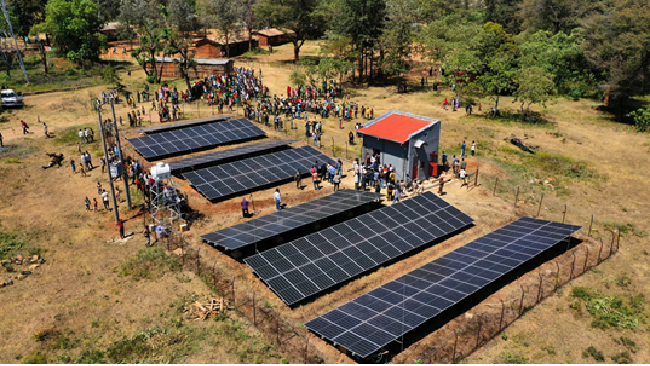EU Fosters Rural Electrification in Ethiopia through Solar Mini-Grids and Off-Grid Renewable Energy Solutions (EnDev)

Introduction:
The European Union co-funded the Energising Development (EnDev) programme in Ethiopia, which included the development of five solar mini-grids and the solar electrification of more than 100 health facilities. The programme also contributed to the development of self-sustaining markets for off-grid solar solutions and improved cookstoves, and kicked off public-private dialogue towards an environmentally-sound end-of-life management of batteries.
Objectives:
Ethiopia has the third largest energy access deficit in Sub-Saharan Africa with about half the population still without access to reliable electricity. Only a fourth of primary schools and a third of health clinics have access to electricity. This situation limits Ethiopia’s potential for economic growth and social development, especially in rural areas. Furthermore, the reliance on traditional biomass fuels (over 90% of households using firewood or charcoal) cause severe health issues – disproportionately affecting women – and contribute to environmental degradation and climate change.
The National Electrification Programme 2.0 outlined a plan to reach universal access to electricity in Ethiopia in the next decade, with a 65% grid vs. 35% off-grid split in the mid-term. In recent years however, the rate of grid-based electrification was around 250,000 new connections per year, far behind the national target of 1,000,000. Similarly, only a few mini-grids were installed in Ethiopia (13 as of December 2024) and the local market for off-grid solar solutions and cookstoves remains characterised by low-quality technologies, often not compliant with national standards.
Against this backdrop, the European Union co-funded the EnDev programme implemented by the German Agency for International Cooperation (GIZ) to foster rural electrification in Ethiopia through sustainable, modern, clean and affordable solutions. The project supported notably the commercial dissemination of quality off-grid solar systems and improved cookstoves, financed the solar electrification of more than 100 health facilities as well as the installation of five pioneering solar-powered mini-grids. It also improved the enabling environment for an environmentally sound end-of-life management of batteries in Ethiopia and strived to identify pathways with local partners in view of scaling up sustainable investments in rural electrification in the coming years.
Project Activities:
Solar-powered mini-grids
- Design and installation of five solar mini-grids in four remote rural villages in Oromia, Somali and South Ethiopia regions (with distribution lines financed and installed by regional governments)
- Setting-up, technical training and capacity building of four cooperatives to govern, operate and maintain the mini-grids with support of the local private sector
- Definition of appropriate tariffs balancing affordability of households and sustainability (e.g. battery replacement, cooperative staff salaries)
- Development of productive use of renewable energy
Solar electrification of social institutions
- Installation of stand-alone systems in health facilities in partnership with local energy private companies
Commercial dissemination of off-grid solar solutions and improved cookstoves
- Technical and business training for local manufacturers and retailers
- Development of financing schemes
- Promotional campaigns
- Support to innovation and semi-industrial production of improved cookstoves
End-of-life management of batteries
- Production of assessments, technical guidelines, roadmap and draft regulation
- Training for private and institutional stakeholders
Results:
- More than 20,000 people to gain access to modern and reliable electricity supply through five community-run solar-powered mini-grids (685 kWp overall)
- More than 100 health facilities equipped with standalone solar systems (up to 2.4kWp) in remote rural villages
- Improved enabling environment (assessment, training, public-private dialogue, roadmap and draft regulation) towards an environmentally-sound end-of-life management of lead-acid batteries
- More than 1,000,000 people gaining commercial access to improved cook stoves
- More than 1,000,000 people gaining commercial access to off-grid solar solutions
- More than 300,000 tonnes CO2eq of greenhouse gas emissions are avoided annually




